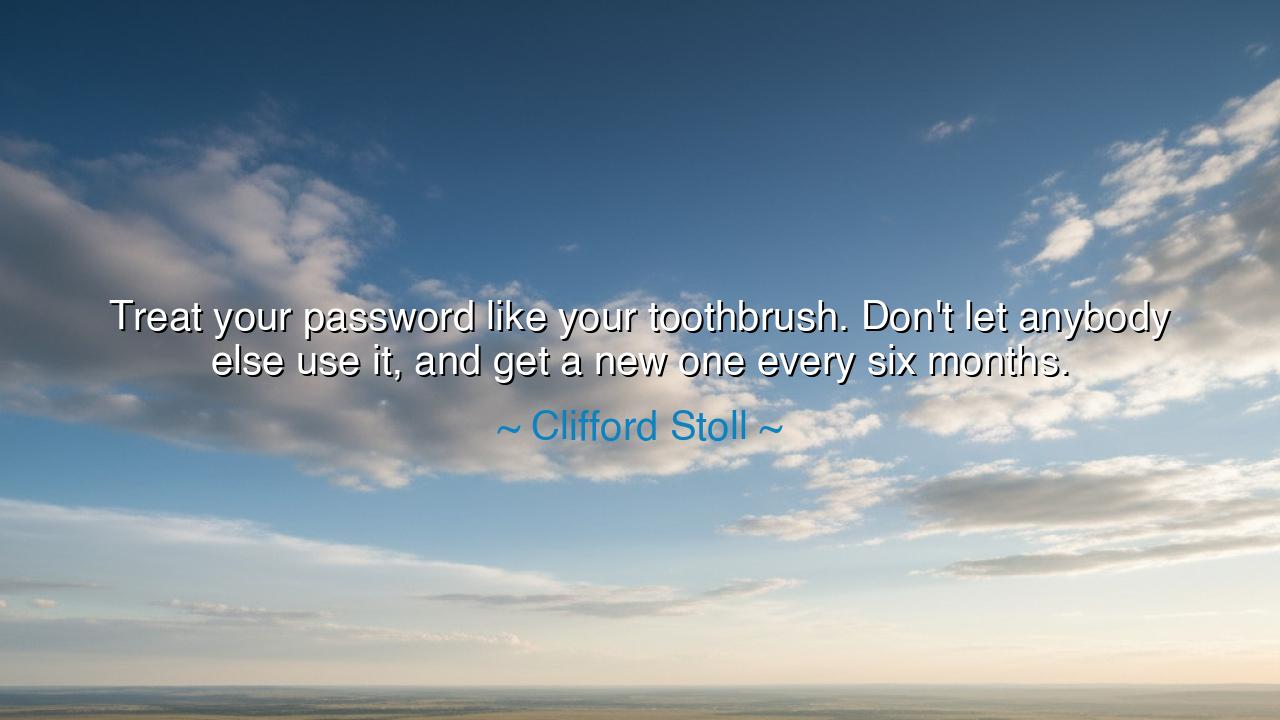
Treat your password like your toothbrush. Don't let anybody else
Treat your password like your toothbrush. Don't let anybody else use it, and get a new one every six months.






Hear now, O Seekers of Wisdom, for the words of Clifford Stoll ring with the clarity of truth in a world where vigilance and discretion are essential. "Treat your password like your toothbrush. Don't let anybody else use it, and get a new one every six months." At first glance, these words may seem simple, even humorous, but beneath their surface lies a profound lesson in the care and protection of what is most personal and valuable to us. The password, much like the toothbrush, is a symbol of intimacy and security, a tool that guards our most sacred spaces—our thoughts, our actions, our identities.
Consider, O Seekers, the toothbrush, that humble instrument that we use daily to preserve our health and hygiene. It is an item of such personal nature that we would never think of allowing another to use it. To share it would be an offense against the most basic sense of personal care, for it carries with it the residue of our own being—our breath, our essence. So too, the password is the key to our digital selves, a symbol of access to our private lives, our secrets, our very identity. Just as we guard our toothbrush against the touch of others, so too must we guard our passwords—for they are the entry points to our digital world, a world that is as real and as personal as any physical realm.
In ancient times, the gates to a city were fiercely guarded, and only those who held the proper keys were allowed entry. So too must we guard the keys to our digital gates. The password is no mere combination of characters, but the sentinel at the threshold of our most private domains. It is a weapon, a shield, and a marker of who we are. To entrust it to others, or to let it fall into disrepair, is to invite harm upon ourselves, just as leaving the gates of a city unguarded invites invasion. The importance of password security is a lesson taught not only by those who dwell in the digital age but by the wisdom of the ages themselves.
Consider the fate of those who have been careless with their secrets. The great cities of old, like Babylon or Rome, were undone not only by external enemies but by the betrayal within their walls. A single unguarded secret, a lapse in vigilance, and the city would fall. In our modern world, this principle holds true. If we do not treat our passwords with the utmost care, we open ourselves to the invasion of those who seek to do us harm—those who would use our passwords against us, stealing our identity, our information, and even our peace of mind.
The wisdom of Stoll extends beyond the simple act of changing a password every six months. It is a call to practice vigilance, to be mindful of the tools that protect our lives. We are the stewards of our own safety, and it is our responsibility to ensure that the gates of our digital realm remain closed to those who would misuse them. Just as the toothbrush is a daily tool for our personal care, so too must the password be treated with regular attention, maintained and renewed, ever mindful of the need for fresh protection against the evolving threats of the world.
In our own lives, we must learn to apply the same principles that Stoll so wisely advocates. We must guard our most private selves—our thoughts, our identities, our possessions—against those who would seek to take them. We must be vigilant in the face of threats, both seen and unseen, and take regular action to renew and protect what is most precious. Just as we wash and renew our toothbrushes to maintain their cleanliness, so too must we refresh our passwords, keeping them strong and unique, untouched by the hands of others.
The lesson is clear, O Seekers: our passwords are not just digital keys but sacred guardians of our identity. To treat them with care, to protect them with diligence, is not merely an act of caution but one of wisdom. Guard them as you would guard your heart, for they are the entry points to all that is yours. And in doing so, you will ensure that the gates of your world remain secure, and the invaders—whether from the shadows of the digital world or the depths of human deceit—will be kept at bay.






AAdministratorAdministrator
Welcome, honored guests. Please leave a comment, we will respond soon